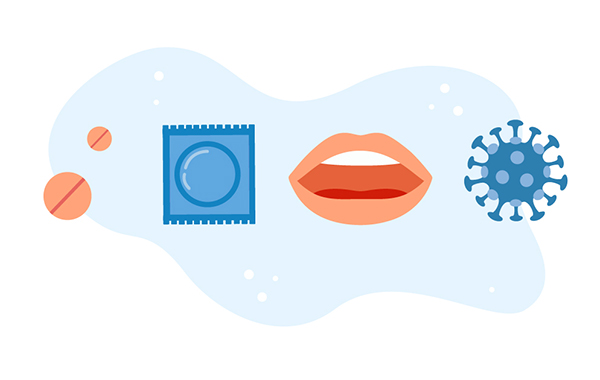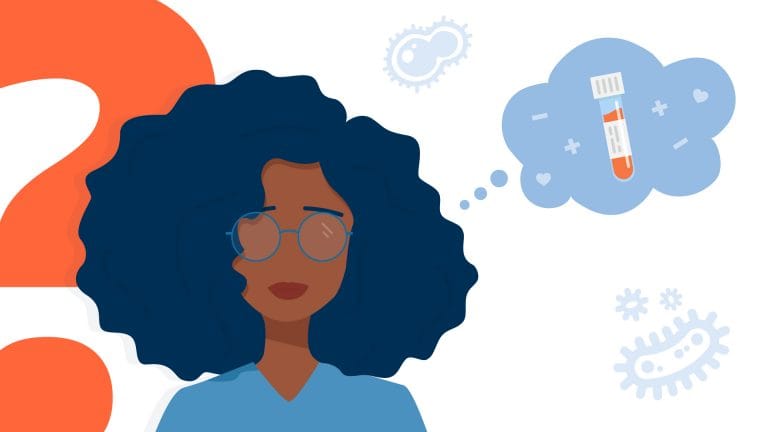

STD Symptoms
Sexually Transmitted Diseases (STDs) or Sexually Transmitted Infections (STIs) can have a wide variety of different symptoms depending on the infection or disease. However, more often than not, those who become infected will show no symptoms at all. The only way to know for sure is to get tested and know your status.
Get Tested NowIn most instances of STD cases, there is no single symptom or set of STD symptoms that can help you self-diagnose a sexually transmitted disease. And when symptoms are apparent, they may not be unique to one STD in particular. STDs like gonorrhea, chlamydia, syphilis and others commonly display symptoms similar to one another. And more often than not, STDs will display no symptoms whatsoever. And because symptoms aren’t always apparent, many who contract an STD will never know it–and may unwittingly pass it along to one or more sexual partners. Unfortunately, even in these asymptomatic instances, untreated STDs can develop into more serious health issues. The only way to know for sure if you’ve contracted an STD, is to find a reputable STD testing service and get tested when appropriate. If you do test positive, your physician will be able to assist you in finding the treatment option that’s best for you. You’ll also want to contact any and all recent sexual partners so that they can get tested as well. Fortunately, if caught early enough, most STDs can be treated fairly easily and many are completely curable as well.

Signs of an STD
Educating yourself about STD symptoms and warning signs of an STD can be extremely valuable in minimizing your risk of contracting an STD (not to mention the risk of any sexual partners as well). If you suspect you have become infected, it’s crucial to know how to get correctly screened to confirm your suspicion and the steps necessary to seek appropriate treatment options. Consulting with your physician and following the proper treatment regimen early on can, in many cases, spell the difference between a quick and complete recovery and lasting and potentially worsening health complications.
Because many who contract an STD will never experience symptoms, recognizing STD symptoms can be tricky…or downright impossible. One reason why STD incidence rates seem to be continually on the rise throughout the United States is that men and women who become infected, develop no symptoms, and don’t seek out reputable testing services never realize they have an STD. And because they don’t know they’re infected, they put the health of their sexual partners at risk as well.
Of course, not all STD cases are asymptomatic. In these instances, the sooner you recognize a particular bodily irregularity like painful urination or unusual discharge as a symptom of an STD, the sooner you get tested to confirm, the better. Untreated STDs can become more severe and potentially life-threatening conditions that may differ in men and women.
As STD symptoms vary significantly in appearance, severity, and frequency from person to person, proper STD screening remains the only way to know if you’ve been infected. Sexually active adults should consider regular STD screenings as part of their everyday health routines.
Common STD Symptoms
Different STDs can cause various mild to severe symptoms depending on the STD and the person it infects. And even when dealing with the same STD, cases can vary significantly from person to person. For instance, two men similar in age and health background who contract chlamydia at the same time may still see a vastly different experience from one another in terms of symptom severity. And between men and women, symptoms, potential risks, and treatment options can be night and day in terms of the difference between the two. There’s no surefire way to tell if you’ve contracted an STD or which STD it might be. Specific symptoms common to several STDs might indicate that it’s time for an STD screening or physician visit. We’ve broken these common STsymptoms down by sex and frequency in the table below. If you are experiencing any of these symptoms and suspect you might have contracted an STD, it’s best to find a reputable STD testing provider and get tested to know for sure. From there, you can consult with your physician regarding treatment options.
Source: CDC
- No noticeable symptoms
- Blisters on or around penis
- Bumps, spots, or sores on the penis, testicles, or anus
- Clear, white, or yellow discharge from the penis
- Dripping from the tip of the penis (thick or thin)
- Painful urination
- Painful ejaculation
- Rectal pain, discharge, or bleeding (after anal sex)
- Sore throat
- Fever
- Chronic flu-like symptoms
- Pain in the testicles
- Testicle swelling and pain
- Difficulty urinating
- Swelling of joints
- Itching on the tip of the penis
- No noticeable symptoms
- Vaginal discharge (thick or thin; white, yellow, or green)
- Vaginal itching
- Blisters on the vagina, genital area, or anus
- Rash on the vagina, genital area, or anus
- Painful, frequent, or difficult urination
- Pain or bleeding during intercourse
- Bleeding or spotting between menstrual cycles
- Painless ulcers on the vagina, genital area, or anus
- Rectal pain, bleeding, or discharge (after anal sex)
- Pain in the pelvic region
- Lower back pain
- Fever
- Nausea
- Sore throat
- Swelling of the joints
- Chronic flu-like symptoms
Talking to your Partner(s) About Your STD Symptoms
If you think you might have contracted an STD, or you’ve been tested and can confirm such, it’s perfectly normal to have some degree of concern and likely many questions, especially when confronting your sexual partner(s). How should you bring it up? What should you share with them? How will they react? When it comes to sharing news about sexual health with your partner(s), it’s always best to be as open and as honest as possible. Your transparency throughout this process will only help ensure the health and safety of everyone around you. We admit these are not always the most comfortable or easy discussions. But they are essential. Responsible sex doesn’t just mean practicing safe sex and protecting against STDs; it means being a mature adult and initiating difficult conversations when they need to be had.
If you’ve had multiple partners close to the time of your positive test, you will want to contact them, inform them of your positive diagnosis, and suggest they get tested themselves. Indeed, no one likes giving or receiving such news, but these conversations help to keep all parties involved healthy and safe. Although challenging, these conversations are for the best.
If you’re struggling to find the words to say or aren’t sure how to initiate the conversation, several helpful online resources and services can steer you in the right direction or even handle the complex task on your behalf. Granted, it’s always better to hear this kind of news personally from the source, but if the choice is between hearing it from a service or not hearing it at all, the service is always better.
STD Symptoms in Monogamous Relationships
If you’ve been in a committed and monogamous relationship, developing STD symptoms can potentially cause even greater mental anguish and concern. Your mind may start racing, which will only add to the pain and panic of the experience. What can already be a scary experience can now begin to stir up feelings of betrayal. It’s perfectly normal for your mind to land on an unfaithful partner as an obvious explanation. But before throwing out a potentially irreversible accusation, you must remember that while cheating is undoubtedly one way STDs can be introduced into a monogamous relationship, it is NOT the only way.
Consider, perhaps, that you or your partner contracted the STD from a previous sexual relationship and that you’ve/they’ve been asymptomatic until now. Remember, STDs may live in the body undetected for years before symptoms arise (if they ever do, that is). Or maybe your partner has been asymptomatic, passed the infection to you, and you developed symptoms. This is certainly not outside the realm of possibility, especially if STD screenings aren’t part of your regular health monitoring. If you and your partner haven’t been getting regular STD checks, knowing when you were infected and by whom can be challenging. This is why regular testing, even in a committed monogamous relationship, is so important.
If you have some of the symptoms discussed above, click on any of the sections below to learn more about each specific STD and its associated signs and symptoms. While only a healthcare provider can diagnose you for sure, this information can empower you with the necessary knowledge about sexually transmitted infections and diseases and help you to understand what you can expect when you are tested.
To learn more about the unique symptoms of individual sexually transmitted diseases, and why it’s important to seek professional treatment for each, follow the links below:

